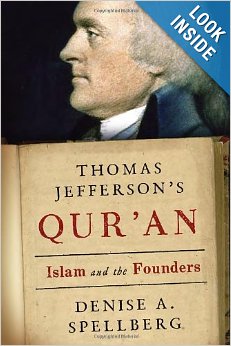www.aljazeerah.info
News, December 2013
Archives
Mission & Name
Conflict Terminology
Editorials
Gaza Holocaust
Gulf War
Isdood
Islam
News
News Photos
Opinion Editorials
US Foreign Policy (Dr. El-Najjar's Articles)
www.aljazeerah.info
Thomas Jefferson's Qur'an:
Islam and the Founders
By Denise Spellberg,
a Book Review
amazon.com, December 4, 2013

***
By Deckle Edge:
In this original and illuminating book, Denise A. Spellberg reveals a
little-known but crucial dimension of the story of American religious
freedom—a drama in which Islam played a surprising role. In 1765, eleven
years before composing the Declaration of Independence, Thomas Jefferson
bought a Qur’an. This marked only the beginning of his lifelong interest
in Islam, and he would go on to acquire numerous books on Middle Eastern
languages, history, and travel, taking extensive notes on Islam as it
relates to English common law. Jefferson sought to understand Islam
notwithstanding his personal disdain for the faith, a sentiment prevalent
among his Protestant contemporaries in England and America. But unlike
most of them, by 1776 Jefferson could imagine Muslims as future citizens
of his new country.
Based on groundbreaking research, Spellberg
compellingly recounts how a handful of the Founders, Jefferson foremost
among them, drew upon Enlightenment ideas about the toleration of Muslims
(then deemed the ultimate outsiders in Western society) to fashion out of
what had been a purely speculative debate a practical foundation for
governance in America. In this way, Muslims, who were not even known to
exist in the colonies, became the imaginary outer limit for an
unprecedented, uniquely American religious pluralism that would also
encompass the actual despised minorities of Jews and Catholics. The
rancorous public dispute concerning the inclusion of Muslims, for which
principle Jefferson’s political foes would vilify him to the end of his
life, thus became decisive in the Founders’ ultimate judgment not to
establish a Protestant nation, as they might well have done.
As
popular suspicions about Islam persist and the numbers of American Muslim
citizenry grow into the millions, Spellberg’s revelatory understanding of
this radical notion of the Founders is more urgent than ever. Thomas
Jefferson’s Qur’an is a timely look at the ideals that existed at our
country’s creation, and their fundamental implications for our present and
future.
***
By Brendan Driscoll:
The English translation of the Qur’an that Thomas Jefferson purchased in 1765 made its most public appearance in 2007, when Minnesota congressman-electKeith Ellison used it for a photo-op reenactment of his taking the oath of office. Jefferson’s Qur’an is, Spellberg shows in this fresh and timely account, important not because it directly influenced Jefferson’s thought—it is not clear how much of the two-volume work he read or what he learned from it—but because its presence in Jefferson’s library reminds us of his progressive positions on religious tolerance, and the extent to which the Founding Fathers’ ideas were shaped by their ideas about Muslims, even though most of the Founders had probably never actually met a Muslim. Spellberg illustrates her thesis in part by describing the slight but significant ways in which colonial Americans came into contact with Muslims, who were thought to reflect the outer limits of a diverse American population. She scours Jefferson’s writings and draws inferences from, among other things, where in his library Jefferson shelved his Qur’an. But Jefferson’s political and diplomatic dealings, which reveal a thoughtful if complicated approach to Islam, are perhaps more revealing. And we are reminded that, in a messy election campaign against John Adams, Jefferson may have been the first presidential candidate to be maliciously accused of being a Muslim.
By John C. Snider:
This book might also be called "The Enlightenment, America and Islam." It's a detailed exploration of how the West viewed Islam during the Enlightenment era, culminating in the Founders' views on religious liberty. While Islam remained a distant, poorly understood belief system to the Founding Fathers, they nonetheless defended rights of conscience to include such (to them) outrageously fringe belief systems as Islam. Jefferson and Adams would be disgusted by the willful ignorance and blithe bigotry of present-day politicians and talking heads, many of whom have made shockingly offensive statements denying that Muslims should enjoy the same freedoms as the rest of us (and by that, of course, they mean "Christians"). Too bad this book wasn't around when Keith Ellison was taking the oath of office on Jefferson's personal copy of the Qur'an.
http://www.amazon.com/Thomas-Jeffersons-Quran-Islam-Founders/dp/0307268225|
|
|
|
||
|
||||||


